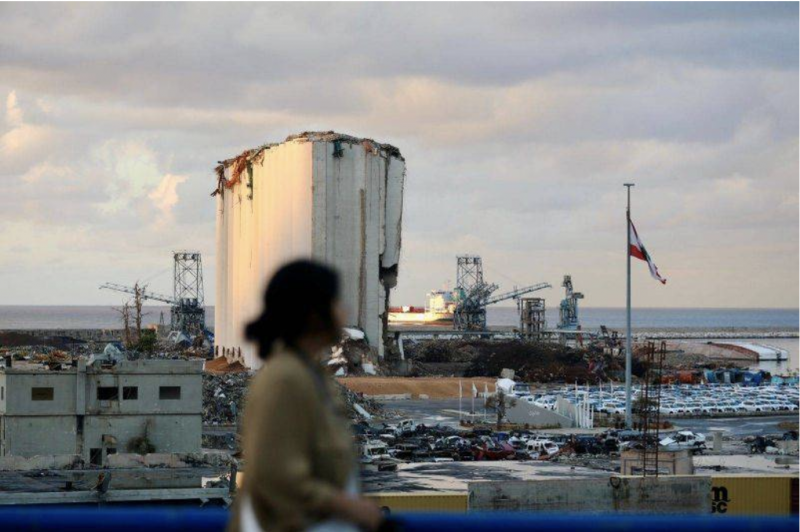
The port of Beirut ravaged after the deadly explosions of August 4, 2020. (Credit: Matthieu Karam/L'Orient Today)
BEIRUT – Maria Rajha was asleep in her house in Dekwaneh when the earthquake struck at 3:20 a.m. on Monday, Feb. 6.
Having lived through the Aug. 4 Beirut blast, the young woman suffered from hallucinations that her bed was shaking, and though they stopped a while ago, she initially thought the quake was another episode. “But the shaking wouldn't end. That's when I realized that this is real and might be another blast.”
Rajha immediately jumped out of bed and joined her family, who were taking cover in the hallway, just like they did on Aug. 4.
“With little to no communication, we were waiting for the boom,” Rajha recounted. When the ground continued to shake, they realized it was an earthquake. But the feelings were the same: “I was having a panic attack throughout,” she said.
The pressure released from the Beirut blast itself was the equivalent of a 3.3 magnitude earthquake. The tremor felt Monday morning was a 4.8.
Hussein Cheaito shared a similar experience in Hamra: “The roof was rattling; it was very intense. Some pictures on the walls fell down. I immediately assumed that it was a blast,” he said.
“I was very confused and scared and didn’t know what to do. I was sprinting around in the apartment, not knowing who to talk to,” Cheaito continued. “So I checked Twitter, and other people were saying it was an earthquake.”
Such feelings were widely expressed on social media in the aftermath of the quake, with many highlighting similarities between the two tragic events.
Earthquake in Beirut strong enough to leap us out of bed as the entire building shook and swayed for a few minutes. Experiencing severe Beirut blast trauma/flashbacks
— Lina Mounzer (@warghetti) February 6, 2023
Loss of control
Dr. Joseph Khoury, chair of Psychiatry at the American Hospital Dubai who lived and worked in Beirut for years, explained to L’Orient Today that “a big reason for people experiencing trauma [is] the fact that they feel they’ve lost control and that this control cannot come back in the future.”
Both the blast and the earthquake were abrupt events and came unexpectedly at “a time where people weren’t necessarily prepared for anything of that sort,” he continued.
“Any new traumatic experience triggers previous traumatic experience,” said Khoury, adding that “what we remember is an intense fear or that [for] one minute you thought that you were going to die. That thought can mark you tremendously and can change even the way you perceive risk or life.”
“That is a shared element between what happened on Aug. 4 and now.”
Rawan Mukalled, too, felt that way when the earth started shaking at her home in Salim Salam.
“It was quite scary when I woke up,” she said. “I didn't process that it was an earthquake at first.” Mukalled initially blamed the tremors on the ongoing storm, but the situation brought back memories of the Aug. 4 blast. She felt “the same fear of being frozen and not knowing what's about to happen next.”
Cheaito concurs: “I think that it’s just a horrible reminder of how helpless you can be in these situations.”
Collective healing
“The fact that it is a collective trauma … people vent together and share experiences on social media or in person,” explained Khoury.
“That, in a way, can alleviate the extent of the traumatic response, and that’s a good thing …People talking [and] sharing, despite the fact that it can look pretty grim on social media, is actually a healthy way of coping,” Khoury continued.
Khoury says experiencing fear together can make recovery faster and easier. He added that drawing comparisons between the earthquake and the blast is natural.
“People are talking about and describing what they lived through, expressing their fear very openly and in a very raw manner. It is actually completely normal and should not be discouraged.”
Khoury noted that concern should be shown if, approximately six months from now, people are “still taking disproportional steps to ‘avoid an earthquake’ or ‘protect [themselves] from an earthquake.’” In this case, he advises people to seek professional help.
However, "if people are suffering tremendously, then they can seek help before that."
Neglectful authorities
Khoury said the fact that Lebanese citizens do not trust authorities to do the bare minimum exacerbates the problem.
Indeed, Cheaito’s first instinct was that tremors were the result of a security incident “because of the constant fear that a potential blast might happen at any point, given the volatility of the situation in Lebanon,” he said.
Khoury said that “People need to feel trust in the responsible authorities. They need to feel that, ‘Okay, the earthquake happened, but we know … what is in place in terms of civil defense, a national warning system [and] community support to deal with the consequences.’”
“There, I think, are a lot of gaps in Lebanon. We tend to accept, ‘Oh well, what can we do about it? These things happen!’ True, but other countries and societies are better prepared, and we need to learn from them how to deal with a disaster,” Khoury continued.
This, he adds, was in contrast to the ongoing response in Turkey, where “authorities seem to be organized despite the fact that they’ve been affected more than us.”
In the meantime, Khoury said people should pursue whatever helps alleviate their anxiety and fear.
“I think people should be provided with things to do to protect themselves, their children, loved ones, and the elderly … All this very simple advice can make people feel less anxious about this happening again. It’s like giving them … a sense of agency.”